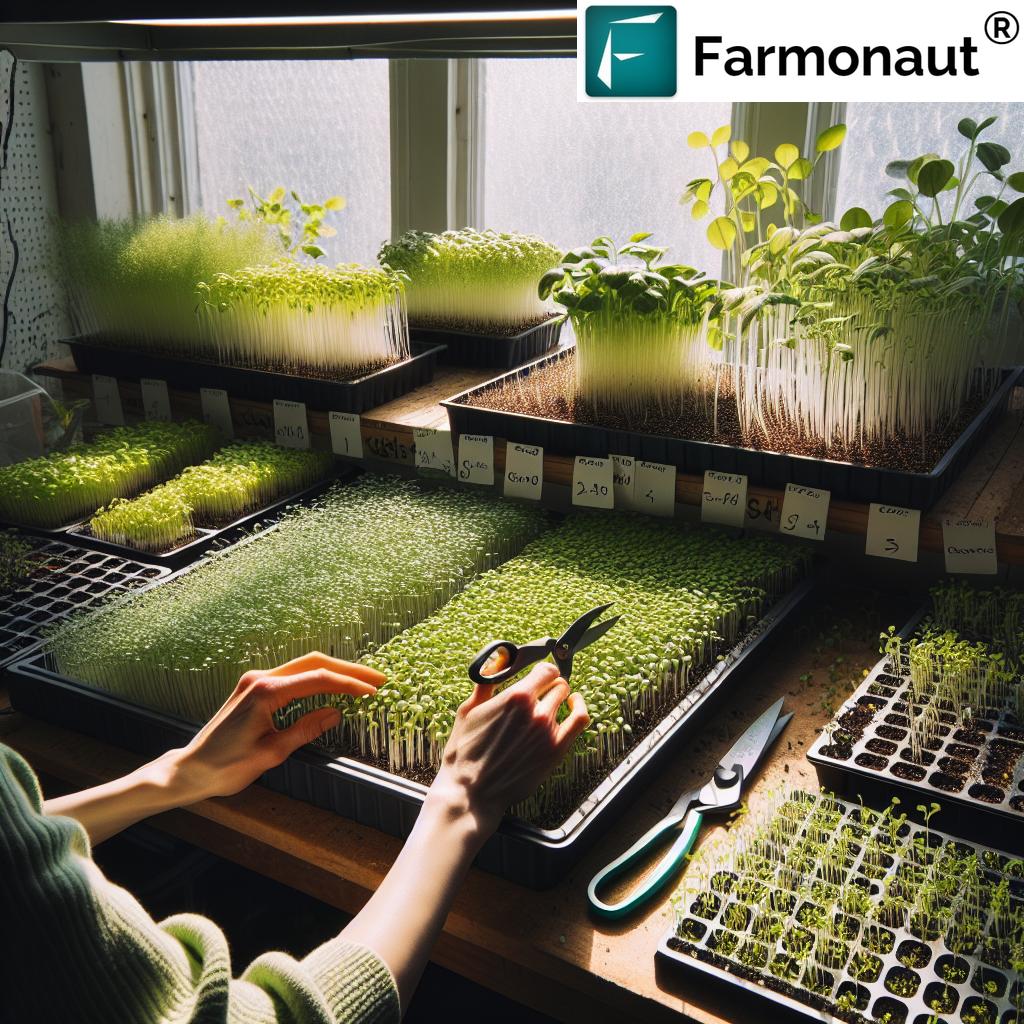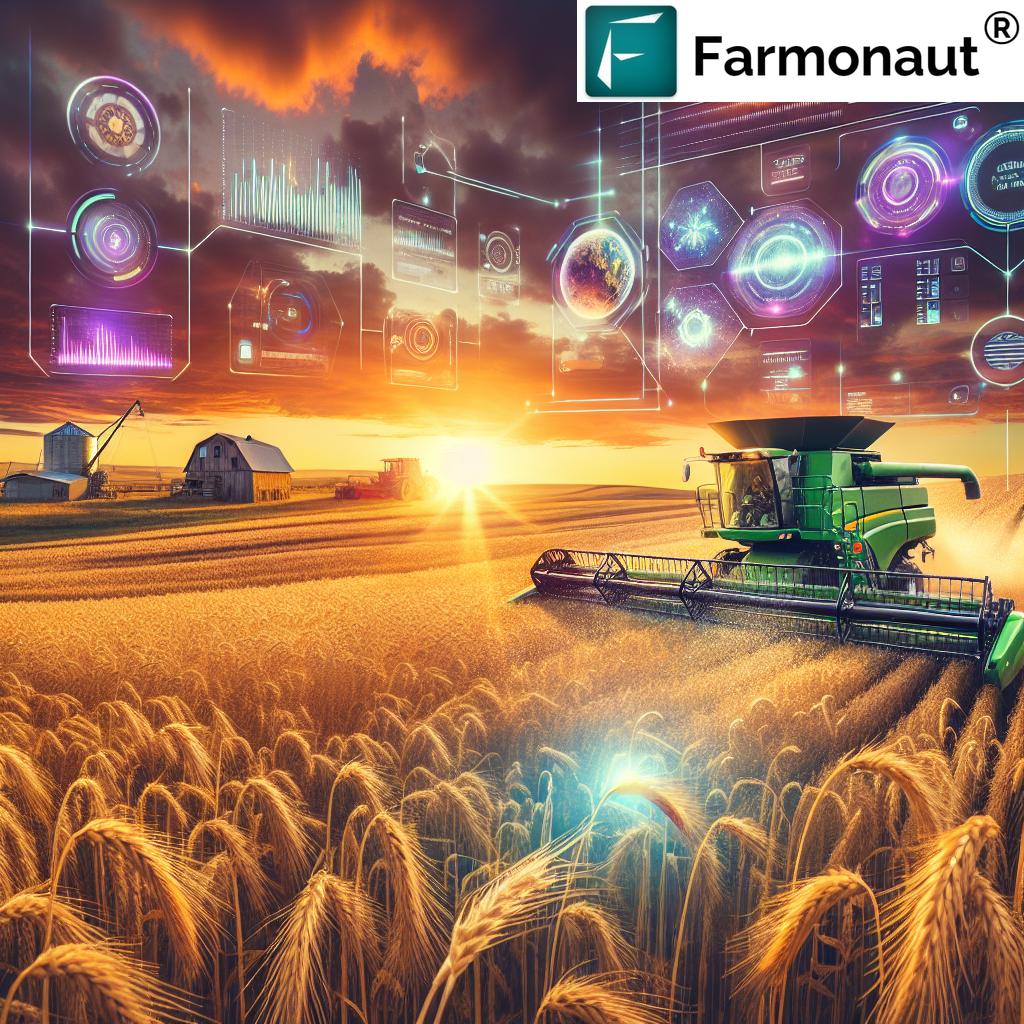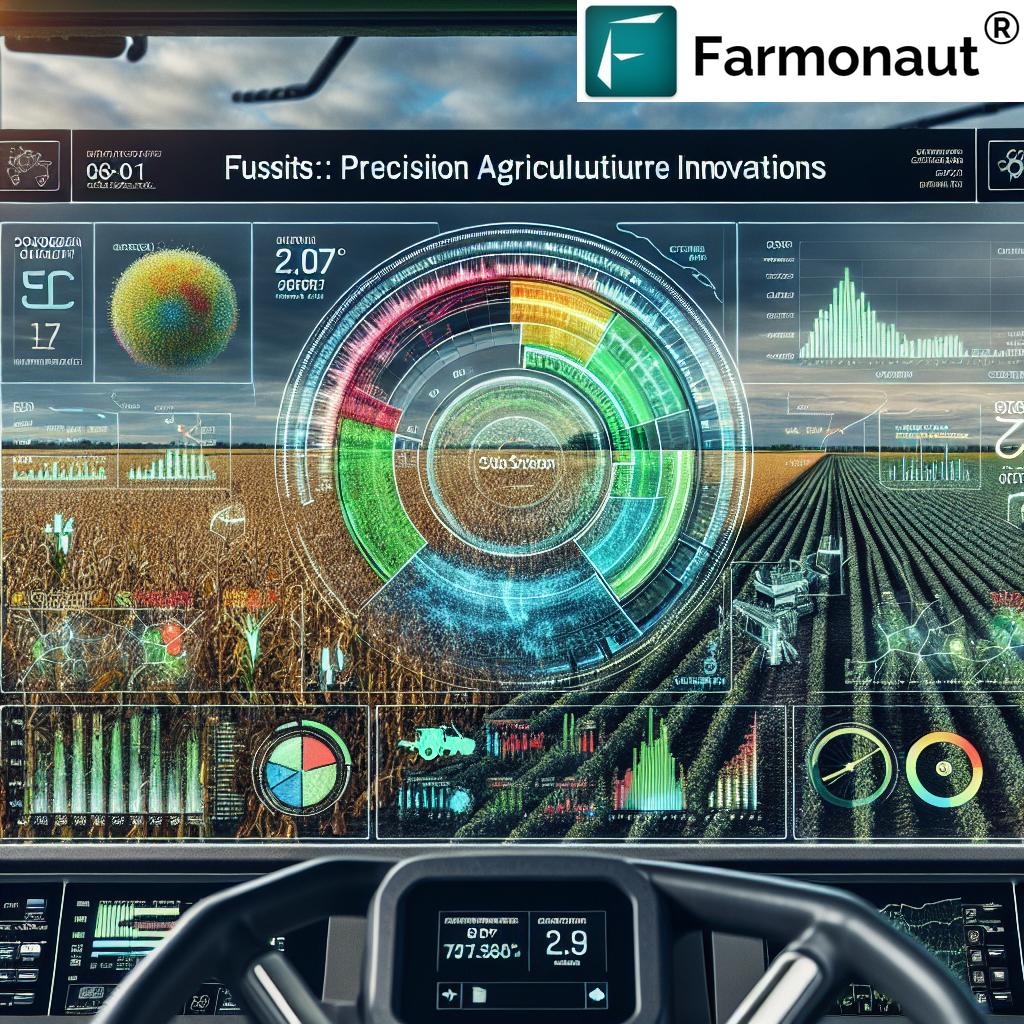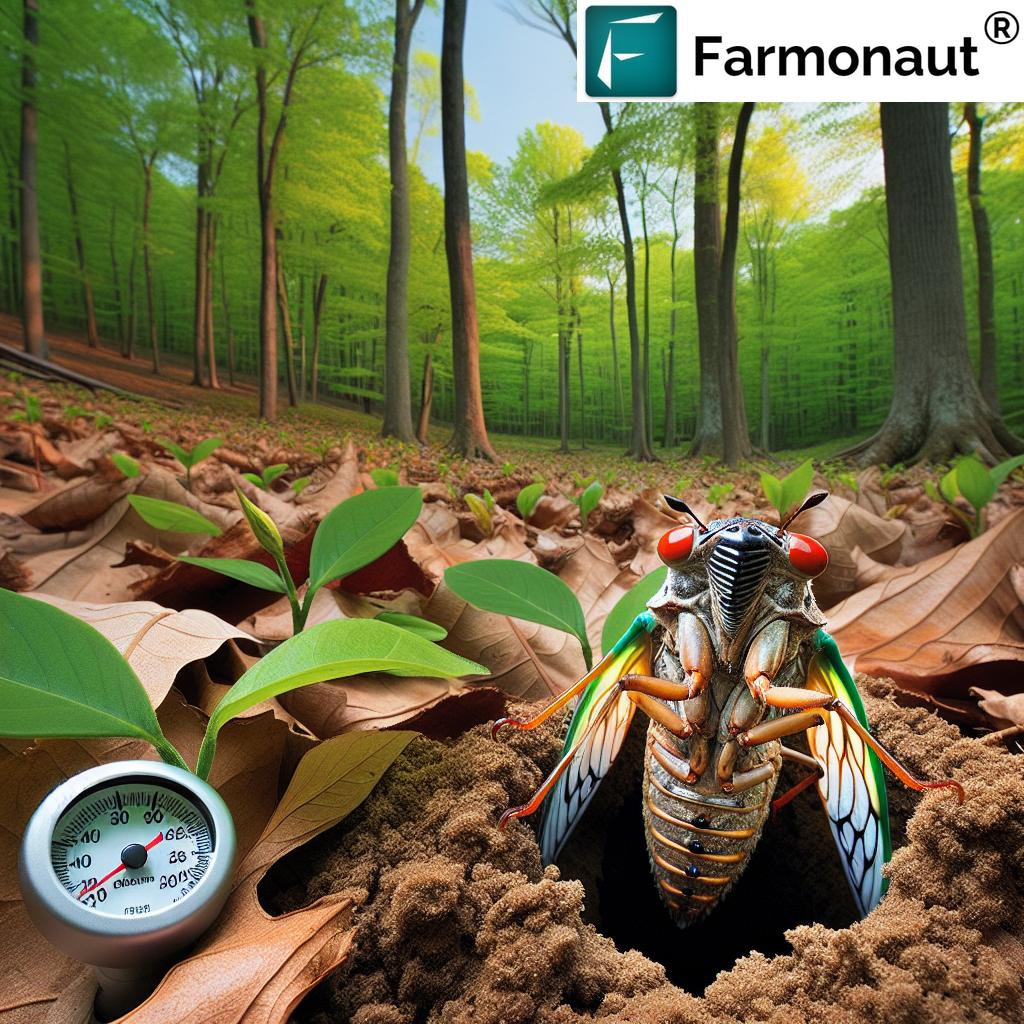Revolutionizing US Corn Belt: Maximizing Yield with Drought-Resistant Hybrids and Advanced Agricultural Technology
“Artesian corn technology outperforms traditional hybrids by up to 12% during severe drought conditions.”
In the heartland of American agriculture, a revolution is underway. The US Corn Belt, long known for its vast expanses of golden fields, is experiencing a transformation that promises to reshape the future of farming. At the forefront of this agricultural renaissance are drought-resistant corn hybrids and cutting-edge agricultural technology, working in tandem to maximize corn yield and ensure food security for generations to come.
We, at Farmonaut, are excited to explore these groundbreaking innovations in crop management, focusing on water-efficient crop varieties that are changing the game for farmers across the nation. In this comprehensive guide, we’ll delve into the science behind these resilient plants, engineered to thrive in the Corn Belt and beyond, and examine how precision agriculture solutions are shaping the future of sustainable farming practices.
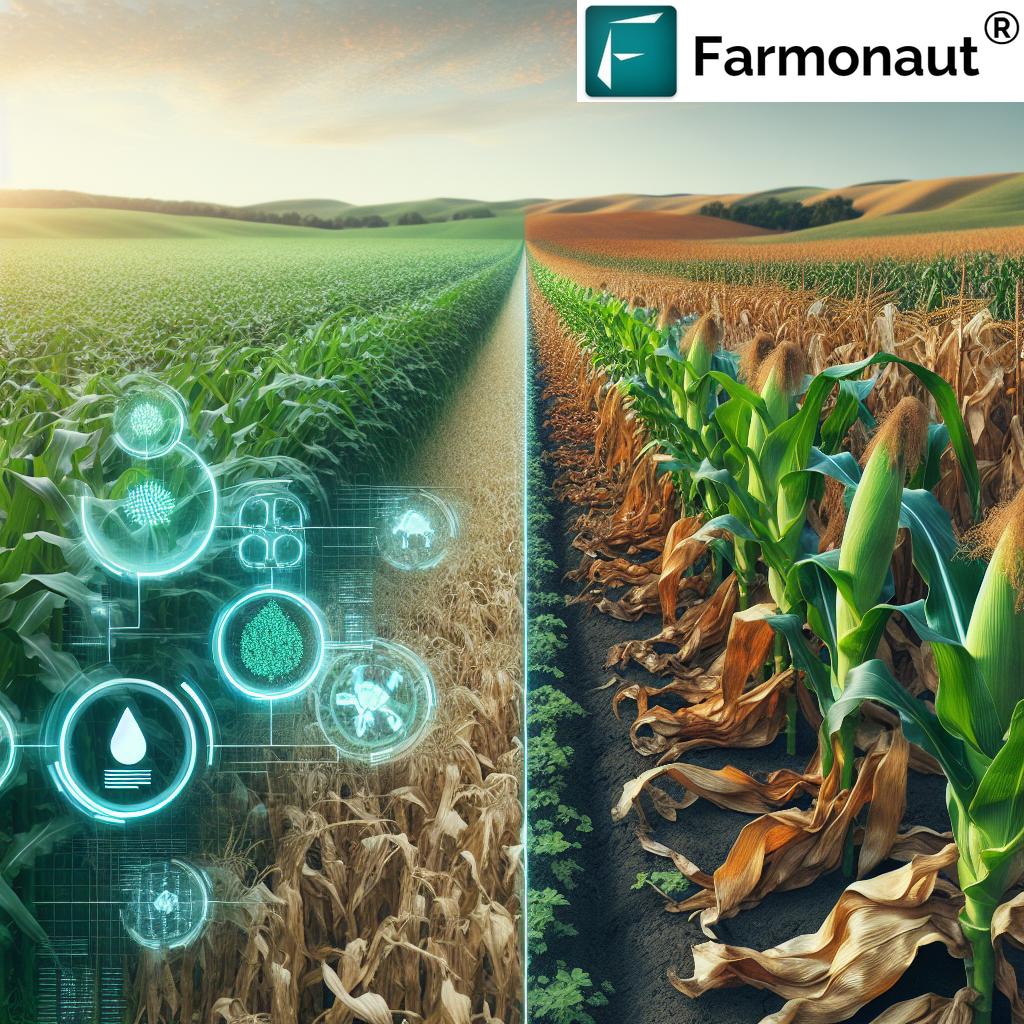
The Rise of Drought-Resistant Corn Hybrids
In recent years, the agricultural industry has witnessed a significant shift towards developing crop varieties that can withstand increasingly unpredictable weather patterns. Drought-resistant corn hybrids have emerged as a beacon of hope for farmers grappling with water scarcity and extreme heat. These innovative seeds are the result of years of research and development, combining traditional breeding techniques with cutting-edge genetic engineering.
One of the most promising advancements in this field is the Artesian® corn technology, which has shown remarkable results in field trials across the Corn Belt. This water-efficient crop variety has been engineered to optimize water usage and nutrient uptake, allowing it to outperform traditional hybrids by up to 12% during severe drought conditions. Such a significant improvement in yield can mean the difference between profit and loss for many farmers facing challenging growing seasons.
Key Features of Drought-Resistant Corn Hybrids:
- Enhanced Root Systems: Deeper, more extensive root networks allow plants to access water and nutrients from a larger soil volume.
- Improved Water Use Efficiency: Advanced genetics enable plants to produce more grain with less water consumption.
- Optimized Stomatal Control: Better regulation of leaf pores helps reduce water loss through transpiration.
- Enhanced Photosynthetic Capacity: Improved ability to maintain photosynthesis under water-stressed conditions.
- Increased Heat Tolerance: Better performance during high-temperature stress, which often accompanies drought.
These features work in concert to create plants that are not only more resilient to drought but also more efficient in their overall resource utilization. This efficiency translates directly into higher yields, even under suboptimal growing conditions.
The Science Behind Resilient Plants
To truly appreciate the impact of drought-resistant corn hybrids, it’s essential to understand the science that drives their exceptional performance. These plants are the result of a complex interplay between genetics, physiology, and environmental adaptation.
Genetic Advancements:
Scientists have identified and enhanced specific genes that play crucial roles in drought tolerance. These include genes responsible for:
- Root architecture and growth
- Osmotic adjustment (the ability to maintain cell turgor under water stress)
- Antioxidant production to protect against cellular damage
- Synthesis of protective proteins that stabilize cellular structures
By fine-tuning these genetic traits, researchers have created corn varieties that can maintain growth and productivity even when water is scarce.
Physiological Adaptations:
Drought-resistant hybrids exhibit several physiological adaptations that set them apart from traditional varieties:
- Improved Pollination: Enhanced pollen viability and silk receptivity during drought stress ensure better kernel set.
- Delayed Leaf Senescence: The ability to stay green longer under stress conditions, maintaining photosynthetic capacity.
- Efficient Nutrient Uptake: Better ability to absorb and utilize nutrients, even in dry soil conditions.
These adaptations allow drought-resistant corn to maintain critical growth processes during periods of water stress, ultimately leading to higher yields.
“Drought-resistant corn hybrids with enhanced root systems and improved pollination are revolutionizing farming in the US Corn Belt.”
Advanced Agricultural Technology: The Precision Farming Revolution
While drought-resistant hybrids form the foundation of resilient corn production, advanced agricultural technology is amplifying their impact. Precision agriculture solutions are providing farmers with unprecedented control over their operations, enabling them to make data-driven decisions that optimize resource use and maximize yield potential.
At Farmonaut, we’re at the forefront of this technological revolution, offering cutting-edge satellite-based farm management solutions. Our platform integrates seamlessly with various precision agriculture tools, providing farmers with a comprehensive suite of crop management capabilities.
Key Components of Precision Agriculture:
- Satellite Imagery and Remote Sensing: High-resolution satellite data provides real-time insights into crop health, allowing for early detection of stress and prompt intervention.
- GPS-Guided Equipment: Precision planting and harvesting equipment ensures optimal seed placement and efficient harvesting, reducing waste and improving yield.
- Variable Rate Technology (VRT): Allows for precise application of inputs such as fertilizers and pesticides based on specific field conditions.
- Soil Moisture Sensors: Provide accurate, real-time data on soil moisture levels, enabling precise irrigation scheduling.
- Weather Stations: On-site weather monitoring helps farmers make informed decisions about planting, spraying, and harvesting.
These technologies work in synergy with drought-resistant hybrids to create a robust system of crop management that can withstand the challenges posed by changing climate patterns.
The Impact on Corn Belt Crop Management
The integration of drought-resistant hybrids and advanced agricultural technology is transforming crop management practices across the US Corn Belt. Farmers are now able to:
- Optimize planting densities based on soil moisture profiles and hybrid characteristics
- Fine-tune irrigation schedules to match the specific water requirements of drought-resistant varieties
- Adjust fertilizer applications to support the enhanced nutrient uptake capabilities of these hybrids
- Make informed decisions about pest and disease management based on real-time crop health data
This level of precision in crop management not only leads to higher yields but also promotes more sustainable farming practices by reducing water usage, minimizing chemical inputs, and improving overall resource efficiency.
Explore Farmonaut’s API | API Developer Docs
Environmental Stewardship and Biodiversity
As we continue to push the boundaries of agricultural productivity, it’s crucial to consider the broader environmental impact of our farming practices. The adoption of drought-resistant hybrids and precision agriculture technologies offers significant benefits in terms of environmental stewardship:
- Water Conservation: By utilizing water-efficient crop varieties and precise irrigation management, farmers can significantly reduce their water footprint.
- Reduced Chemical Use: Targeted application of pesticides and fertilizers minimizes runoff and protects surrounding ecosystems.
- Soil Health: Improved crop resilience and reduced tillage practices help maintain soil structure and promote beneficial soil microorganisms.
- Biodiversity Support: More efficient land use allows for the preservation of natural habitats and the creation of wildlife corridors.
These environmental benefits align with the growing global emphasis on sustainable agriculture and biodiversity conservation. By adopting these innovative approaches, farmers in the Corn Belt are not only securing their own futures but also contributing to the long-term health of our planet.
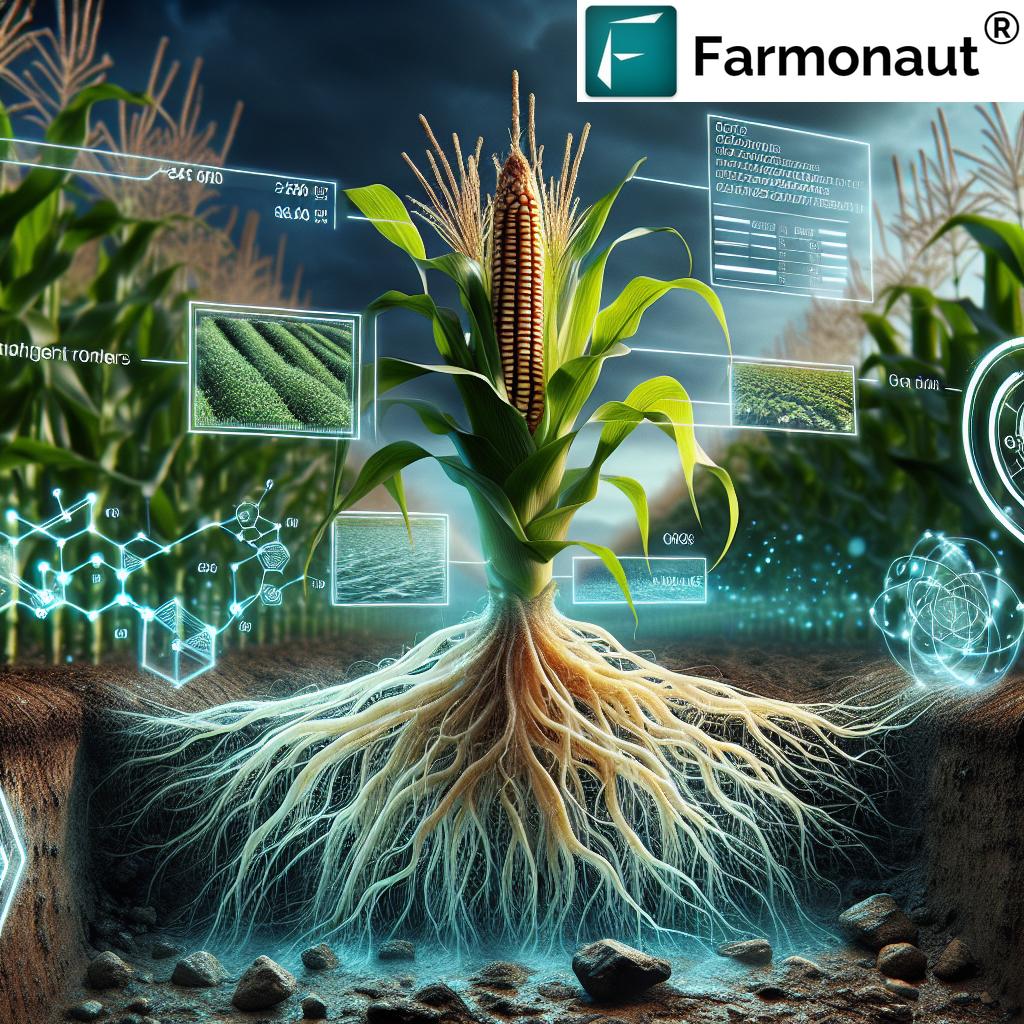
The Role of Data in Modern Agriculture
In the era of smart farming, data has become as essential as seeds and soil. The ability to collect, analyze, and act on vast amounts of agricultural data is revolutionizing how we approach crop management. At Farmonaut, we understand the power of data-driven decision-making in agriculture.
Our platform leverages advanced algorithms and machine learning to transform raw data into actionable insights. This enables farmers to:
- Predict crop yields with greater accuracy
- Identify potential issues before they become serious problems
- Optimize resource allocation based on historical and real-time data
- Track and improve farm performance over time
By harnessing the power of big data, farmers can make more informed decisions that lead to improved productivity, reduced costs, and enhanced sustainability.
Download Farmonaut’s Android App

The Future of Corn Belt Agriculture
As we look to the future, the convergence of drought-resistant corn hybrids and advanced agricultural technology paints an exciting picture for the US Corn Belt. We can expect to see:
- Continued Genetic Improvements: Ongoing research will likely yield even more resilient and productive corn varieties.
- Integration of AI and Machine Learning: These technologies will further enhance our ability to predict and respond to agricultural challenges.
- Expansion of Precision Agriculture: As technology becomes more accessible, more farmers will adopt precision farming techniques.
- Climate-Smart Agriculture: Farming practices will increasingly be tailored to mitigate and adapt to climate change impacts.
- Enhanced Food Security: Improved yields and resource efficiency will help ensure a stable food supply for a growing global population.
These advancements promise not only to increase productivity but also to make agriculture more sustainable and resilient in the face of environmental challenges.
Comparing Drought-Resistant Corn Hybrids
To better understand the impact of drought-resistant corn hybrids, let’s take a closer look at how they compare to traditional varieties:
| Corn Variety | Water Efficiency (%) | Yield in Normal Conditions (bushels/acre) | Yield in Drought Conditions (bushels/acre) | Root System Depth (inches) | Pollination Success Rate (%) |
|---|---|---|---|---|---|
| Traditional Hybrid | 70 | 180 | 120 | 24 | 80 |
| Drought-Resistant Hybrid A | 85 | 190 | 150 | 30 | 90 |
| Drought-Resistant Hybrid B | 88 | 195 | 160 | 32 | 92 |
| Artesian® Technology | 92 | 200 | 170 | 36 | 95 |
As we can see from this comparison, drought-resistant hybrids, particularly those utilizing Artesian® technology, show significant improvements across all key performance metrics. The enhanced water efficiency and deeper root systems translate into higher yields, especially under drought conditions. The improved pollination success rate further contributes to the overall resilience and productivity of these advanced hybrids.
Implementing Drought-Resistant Hybrids: Best Practices
While drought-resistant corn hybrids offer significant advantages, their successful implementation requires careful planning and management. Here are some best practices for farmers looking to integrate these advanced varieties into their operations:
- Soil Analysis: Conduct thorough soil tests to understand nutrient levels and water-holding capacity.
- Hybrid Selection: Choose hybrids that are specifically adapted to your local climate and soil conditions.
- Planting Strategy: Adjust planting dates and densities based on the hybrid’s characteristics and expected weather patterns.
- Irrigation Management: Implement precision irrigation systems to complement the water-efficient nature of these hybrids.
- Nutrient Management: Tailor fertilizer applications to support the enhanced nutrient uptake capabilities of drought-resistant varieties.
- Integrated Pest Management: Develop a comprehensive pest management strategy that takes into account the unique traits of these hybrids.
- Continuous Monitoring: Utilize satellite imagery and other precision agriculture tools to track crop health and respond promptly to any issues.
By following these practices, farmers can maximize the benefits of drought-resistant hybrids and achieve optimal yields even in challenging conditions.
The Economic Impact on Farmers and Communities
The adoption of drought-resistant corn hybrids and advanced agricultural technologies has far-reaching economic implications for farmers and rural communities in the Corn Belt:
- Increased Profitability: Higher yields and reduced input costs lead to improved profit margins for farmers.
- Risk Mitigation: Greater resilience to drought and other environmental stressors helps stabilize farm incomes.
- Job Creation: The growth of precision agriculture creates new employment opportunities in technology and data analysis.
- Rural Economic Development: Increased farm productivity can stimulate economic growth in surrounding communities.
- Global Competitiveness: Advanced farming practices help U.S. corn producers maintain a competitive edge in international markets.
These economic benefits contribute to the long-term sustainability of agriculture in the Corn Belt, ensuring that farming remains a viable and attractive profession for future generations.
Challenges and Considerations
While the benefits of drought-resistant corn hybrids and advanced agricultural technology are clear, there are also challenges and considerations that farmers and policymakers must address:
- Initial Investment Costs: Adopting new technologies and hybrid seeds can require significant upfront investment.
- Learning Curve: Farmers may need additional training to effectively utilize precision agriculture tools.
- Data Privacy and Security: The collection and use of farm data raise important questions about privacy and data ownership.
- Equitable Access: Ensuring that small and medium-sized farms have access to these technologies is crucial for widespread adoption.
- Environmental Balance: While more efficient, care must be taken to ensure that intensified production doesn’t lead to unintended environmental consequences.
Addressing these challenges will be crucial to realizing the full potential of these agricultural innovations across the Corn Belt.
Conclusion: A New Era for Corn Belt Agriculture
The integration of drought-resistant corn hybrids and advanced agricultural technology is ushering in a new era for the US Corn Belt. This powerful combination of genetic innovation and precision farming is not only maximizing corn yields but also promoting more sustainable and resilient agricultural practices.
As we look to the future, the continued development of these technologies promises to help farmers meet the growing global demand for food while adapting to the challenges of climate change. By embracing these innovations, the Corn Belt is positioning itself at the forefront of modern agriculture, setting a standard for productivity, sustainability, and environmental stewardship.
At Farmonaut, we’re proud to be part of this agricultural revolution, providing farmers with the tools and insights they need to thrive in this new era. Together, we’re building a more resilient and productive future for corn production in the United States and beyond.
FAQs
- What are drought-resistant corn hybrids?
Drought-resistant corn hybrids are specially developed varieties of corn that can maintain higher yields under water-stressed conditions compared to traditional varieties. They achieve this through genetic improvements that enhance water use efficiency, root system development, and overall plant resilience. - How do drought-resistant hybrids compare to traditional corn varieties in terms of yield?
Drought-resistant hybrids can outperform traditional varieties by up to 12% during severe drought conditions. In normal conditions, they often produce comparable or slightly higher yields. - What is Artesian® corn technology?
Artesian® corn technology is an advanced breeding approach that develops corn hybrids with superior drought tolerance. These hybrids are designed to optimize water usage and nutrient uptake, resulting in improved performance under water-stressed conditions. - How does precision agriculture complement drought-resistant corn hybrids?
Precision agriculture technologies, such as satellite imagery and GPS-guided equipment, allow farmers to optimize the management of drought-resistant hybrids. These tools enable precise application of inputs, targeted irrigation, and real-time monitoring of crop health, maximizing the potential of these advanced varieties. - Are drought-resistant corn hybrids more expensive than traditional seeds?
While drought-resistant hybrids may have a higher initial cost, their improved performance under stress conditions often results in better overall returns on investment, especially in areas prone to drought or water scarcity. - How do drought-resistant hybrids contribute to sustainable farming practices?
These hybrids promote sustainability by improving water use efficiency, reducing the need for irrigation, and maintaining productivity under challenging conditions. This leads to more efficient use of resources and can help reduce the environmental impact of corn production. - Can small-scale farmers benefit from these advanced agricultural technologies?
Yes, while there may be initial investment costs, many precision agriculture tools and drought-resistant hybrids are becoming increasingly accessible to small-scale farmers. Platforms like Farmonaut offer affordable solutions that can benefit farms of all sizes. - How does Farmonaut support farmers in implementing these advanced agricultural practices?
Farmonaut provides satellite-based farm management solutions that complement the use of drought-resistant hybrids. Our platform offers real-time crop health monitoring, AI-based advisory systems, and resource management tools to help farmers optimize their operations and maximize yields.














